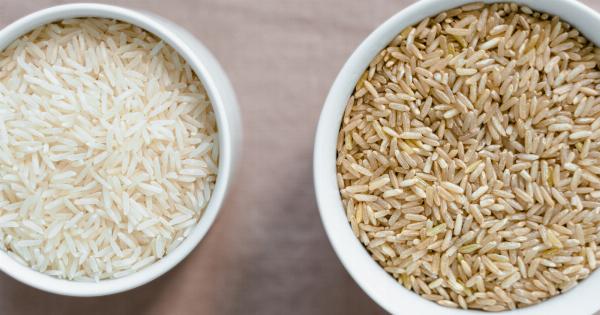Ulcerative colitis is a chronic inflammatory bowel disease that affects the lining of the colon and rectum. It causes symptoms like abdominal pain, diarrhea, and rectal bleeding.
While there is no specific diet that works for everyone with ulcerative colitis, certain foods are known to be beneficial for managing symptoms and promoting overall gut health. Here are some of the best foods to include in your diet if you have ulcerative colitis:.
1. Fish
Fatty fish like salmon, mackerel, and sardines are rich in omega-3 fatty acids, which have anti-inflammatory properties. Including fish in your diet can help reduce inflammation in the gut and alleviate symptoms of ulcerative colitis.
It is recommended to consume fish at least twice a week.
2. Vegetables
Vegetables, particularly those that are well-cooked and easy to digest, can provide essential nutrients while being gentle on the digestive system. Opt for low-fiber options like spinach, carrots, zucchini, and green beans.
These vegetables are not only packed with vitamins and minerals but also promote a healthy gut.
3. Fruits
Fruits are generally well-tolerated by people with ulcerative colitis, especially when they are peeled and cooked. Opt for softer fruits like bananas, applesauce, melons, and cooked fruits to reduce the risk of triggering symptoms.
Fruits provide vital nutrients and antioxidants, supporting overall health.
4. Probiotics
Probiotics are beneficial bacteria that help maintain a healthy balance in the gut. They can be found in fermented foods like yogurt, kefir, sauerkraut, and pickles.
Including probiotic-rich foods in your diet can help reduce inflammation and support gut health in ulcerative colitis.
5. Whole Grains
Opting for whole grains like brown rice, oatmeal, and quinoa instead of refined grains can provide necessary fiber while being gentler on the digestive system.
Whole grains are excellent sources of energy and also help regulate bowel movements, reducing the risk of diarrhea.
6. Lean Proteins
Choose lean sources of protein like skinless poultry, eggs, tofu, and low-fat dairy products. These protein sources are easier to digest and less likely to cause inflammation in the gut.
Including enough protein in your diet is essential for maintaining muscle mass and promoting healing.
7. Healthy Fats
Include sources of healthy fats like avocados, olive oil, and nuts in your diet. These fats provide essential nutrients and can help reduce inflammation in the gut.
However, it is important to consume them in moderation as high-fat foods may worsen symptoms for some individuals.
8. Herbal Teas
Herbal teas like chamomile, ginger, and peppermint can have a soothing effect on the digestive system. They can help reduce inflammation and alleviate symptoms like abdominal pain and bloating.
Sipping on these teas throughout the day can promote overall gut health.
9. Nutritional Supplements
For some individuals with ulcerative colitis, it may be challenging to obtain all the necessary nutrients from foods alone. In such cases, nutritional supplements can be beneficial.
Consult with a healthcare professional to determine if any specific supplements are suitable for you.
10. Adequate Hydration
Staying hydrated is crucial for individuals with ulcerative colitis, as diarrhea and fluid loss are common symptoms. Drink plenty of water throughout the day and limit caffeine and alcohol, as they can worsen symptoms.
Foods to Avoid for Ulcerative Colitis
While certain foods can be beneficial for managing ulcerative colitis symptoms, others can exacerbate inflammation and trigger flare-ups. Here are some foods to avoid if you have ulcerative colitis:.
1. Dairy Products
Dairy products, particularly in individuals who are lactose intolerant, can cause digestive distress and worsen symptoms of ulcerative colitis. Limit or avoid milk, cheese, and other dairy products to see if there is an improvement in symptoms.
2. High-Fiber Foods
Foods like whole wheat bread, bran, nuts, seeds, and raw fruits and vegetables can be difficult to digest and increase bowel movements.
While fiber is generally considered beneficial for gut health, high-fiber foods may trigger symptoms in individuals with ulcerative colitis. Gradually introduce low-fiber options and monitor how your body responds.
3. Spicy Foods
Spicy foods can irritate the digestive system and potentially worsen symptoms of ulcerative colitis. Limit or avoid spices, hot sauces, and peppers to reduce the risk of triggering flare-ups.
4. Alcohol and Caffeine
Both alcohol and caffeine can stimulate the gut and increase bowel movements, which can be problematic for people with ulcerative colitis. It is advisable to limit or avoid alcoholic and caffeinated beverages to prevent symptoms from worsening.
5. Carbonated Beverages
Carbonated beverages, including sodas and sparkling water, can cause gas and bloating, leading to discomfort for individuals with ulcerative colitis. Opt for still water or herbal teas as alternative beverages.
6. Fried and Fatty Foods
Highly processed and fried foods tend to be high in unhealthy fats that can promote inflammation in the gut. Avoid foods like fried chicken, potato chips, and fast food to prevent worsening of symptoms.
7. Artificial Sweeteners
Artificial sweeteners like sorbitol, mannitol, and xylitol are known to have a laxative effect and can cause diarrhea and bloating in individuals with ulcerative colitis.
Check food labels for these sweeteners and opt for natural sweeteners like stevia or small amounts of honey.
8. Red Meat
While lean proteins are recommended for ulcerative colitis, red meat can be harder to digest and potentially worsen symptoms for some individuals. Limit or avoid beef and opt for other protein sources like poultry or fish.
9. Refined Sugars
Refined sugars, found in desserts, candies, sweetened beverages, and processed snacks, can contribute to inflammation and gastrointestinal distress. Limiting the intake of these sugary foods is important for managing symptoms of ulcerative colitis.
10. Gluten
Some individuals with ulcerative colitis may also have gluten sensitivity or celiac disease. In such cases, avoiding gluten-containing grains like wheat, barley, and rye can help reduce inflammation and improve symptoms.



























